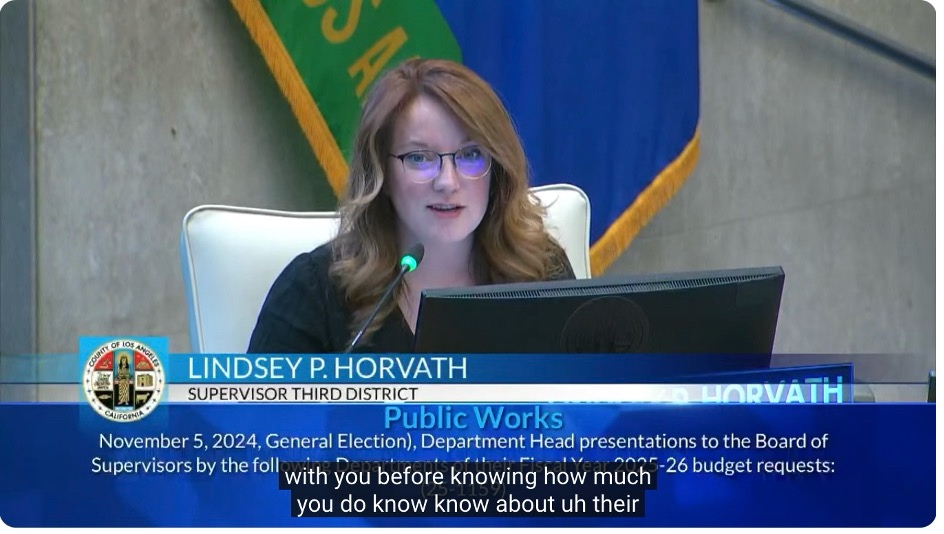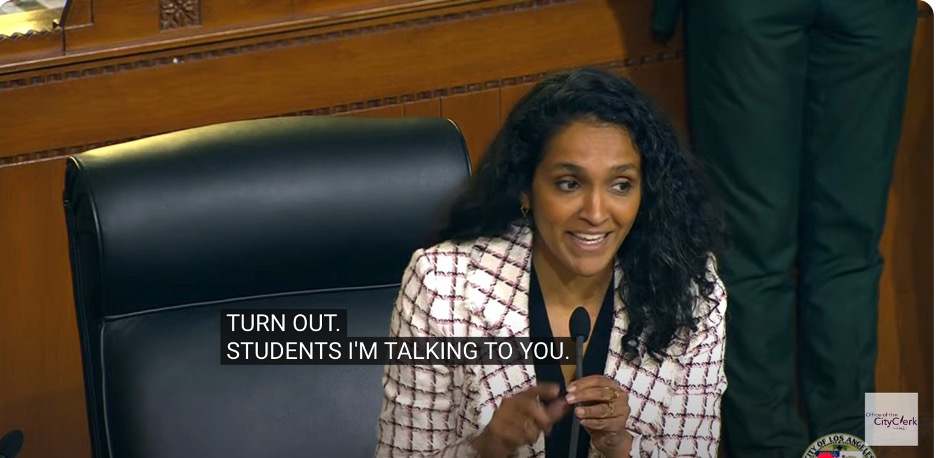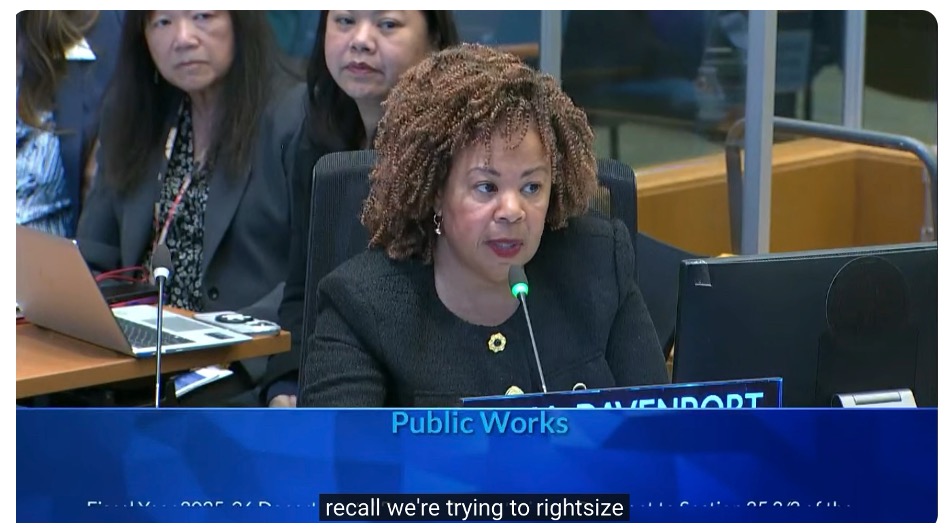Comments
ERIC PREVEN’S NOTEBOOK - Jonathan Groat, Deputy City Attorney: While we wait for the next speaker, if people have additional comments or if we run out of time to hear from you today or at any council meeting, please remember that you can also submit written comments online at lacouncilcomment.com.
Smart Speaker: This implies that some individuals may have expressed concerns about limited access to public comment, but you are directing them toward written submissions rather than directly addressing the lack of virtual testimony. Do you think we don't notice?

We notice.
"I Withdrew This from the LA Times—They Never Respond."
It happened without a vote, without discussion, without even a mention on the agenda. The Los Angeles City Council quietly killed virtual public testimony, stripping residents of one of the few remaining tools they had to participate in government. The official excuse? Efficiency. Order. Moving on from the pandemic era.
But we know better.
This was about silencing critics.
And yet, if you only read the Los Angeles Times, you’d hardly know it happened.
The city’s largest newspaper—one that devotes column inches to parsing Council Q&A clips on Facebook—somehow managed to miss the real story: the fact that working-class Angelenos, seniors, disabled residents, and anyone with a job that doesn’t allow them to sit around for five and a half hours waiting for public comment have been cut out of democracy.
The council’s edict, delivered unilaterally by President Marqueece Harris-Dawson, was covered exactly once in the Times—a polite, tucked-away mention inside a City Hall newsletter. No investigation. No outraged column. No demand for accountability.
The fact that only small, independent outlets have taken this issue seriously should make the Times newsroom squirm.
It should also make them ask: Why does this city’s leadership feel so comfortable suffocating public participation?
Let’s call it what it is: Trumpy.
Yes, you read that right. The same City Council that clutches its pearls over the rise of authoritarianism just used a brute-force procedural move to eliminate public input. It’s not even subtle. If this were happening under a Trump-led city government, the Times would be firing off editorial after editorial about the attack on civic engagement.
Instead, progressive branding gives cover to one of the most blatant acts of public suppression in recent memory.
And for what? A handful of bigoted phone-in commenters? That’s the official excuse being whispered around City Hall. That racists ruined it for everyone, so it was easier to kill the whole system than to moderate or enforce decorum.
That’s cowardice.
More importantly, it’s a lie.
The real reason virtual public comment was eliminated is that the people using it most effectively—tenants, activists, ordinary workers—were saying things the council didn’t want to hear. It was a powerful tool for holding the city accountable, and like all powerful tools wielded by the public, it had to be taken away.
This isn’t something you can walk back quietly. You don’t put the genie of public participation back in the bottle. You don’t get to act like reinstating virtual testimony is some wild, radical experiment.
It’s the bare minimum in a city that already makes public engagement a gauntlet of endurance and privilege.
So here’s a challenge to the Los Angeles Times:
Cover this like it matters.
Not with one buried newsletter blurb. Not after City Hall has sanitized the narrative. Not buried under real estate development updates.
Cover the outrage.
Cover the people locked out of the process.
Cover the fact that a government run by self-described progressives just took a massive leap toward authoritarianism—and this newspaper shrugged.
And to the L.A. City Council, the message is even simpler:
Reinstate virtual testimony.
This was never yours to take.
TGIF Public Comment Recap:
On Friday, 16 speakers took to the podium at City Hall during public comment, raising concerns on firefighter payroll failures, development exemptions for the 2028 Olympics, homelessness, and the city’s ongoing governance issues.
The most dominant themes were the broken payroll system at LAFD, fast-tracked Olympic development at the expense of public input, and the controversial LA Art Gondola project, which critics called a misuse of public land and a backdoor giveaway to private interests.

Council President meeting with predecessor Paul Krekorian about the Olympics.
Anti-Gondola Speaker (Stop the Gondola Coalition)
"I would like to oppose the motion for Olympic exemption. I think it doesn't make any sense to exempt Olympic projects because you exclude community input. We also don’t even know what exactly needs to be built. There are no clear reasons, no clear projects for why this needs to happen. We’re just told that we urgently need to build for the Olympics, so you can’t even say what’s needed. It’s entirely unnecessary.
We don’t even know what projects could be considered Olympic. For example, in Chinatown, we are fighting the LA Art Gondola to Dodger Stadium, which is an inequitable, fake transit system that only caters to Dodger fans. We need something to prevent that from being considered an Olympic project, especially because that was never what it was proposed for.
So you must prevent pre-existing proposals from being considered Olympic projects just to manipulate them into bypassing the approval process. We don’t need the Olympics, and we don’t need the gondola. Thank you."
Call-in testimony canceled:
Smart Speaker: The Los Angeles City Council, once again, appears poised to hand over public assets and regulatory exemptions to the highest bidder. Friday’s meeting exposed how the Olympics have become the magic key that unlocks backroom deals, fast-tracked projects, and corporate giveaways, all while shutting out public input.
The firefighter payroll debacle is a prime example of the city’s failure to prioritize basic governance—if it can’t even pay first responders correctly, how can it be trusted to manage billion-dollar development projects with zero oversight?
Then there’s the gondola—an unasked-for pet project masquerading as transit when in reality, it's a land grab disguised as an infrastructure plan. The concern that it could be rebranded as an “Olympic project” just to avoid scrutiny is exactly why the City’s exemption strategy needs to be stopped in its tracks.
And of course, Casey Wasserman, Olympic puppet master, is once again at the center of it all. Speakers rightly called out his cozy relationship with City Hall, his Olympic Development Authority influence, and his undeniable ties to REDACTED Jeffrey Epstein
So here’s the real question for Councilmember Nithya Raman:
Are you going to let the City repackage existing private development schemes as "Olympic projects" so they can dodge oversight?
If the City’s priority is to hand out exemptions while failing to pay its own firefighters, failing to provide real transit, and failing to safeguard housing from speculative development—then it’s clear the Council is working for the wrong people.
Smart Speaker: Thank you, Council President.
A 102-unit affordable housing project at 12434 Moorpark Street—no parking, fast-tracked under ED1—was quietly tucked under the Christmas tree last year. Now that the lights are on, let’s talk about who actually benefits.
We’re told this is for moderate-, low-, and very low-income renters—but with Studio City’s two-bedroom market rent averaging $3,003, this project could skew toward moderate-income tenants, while the most vulnerable renters are left out. So, where’s the rent breakdown? Who is this actually for?
And let's talk about parking—or the lack of it. Studio City is not transit-rich, and yet this project has zero parking. It’s across from the public library, blocks from Beeman Park, where parking is already in high demand. The city may want fewer cars, but people still need to live their lives. Where’s the mitigation plan? Or is the strategy just to dump the problem on the neighborhood and hope nobody notices?
Meanwhile, around the corner, publicly accessible open space is being handed over to a private school. Weddington Golf & Tennis, 20 acres of prime green space, is being converted into an exclusive athletic facility for 600 Harvard-Westlake students—removing it from public use. All concurrent with Beeman Park and the unwanted Prop K gymnasium (heist) See City BOE.
So let’s get this straight—a private school gets a 20-acre athletic facility, while the public gets a city building in it's park, more congestion and an “affordable” housing project with no infrastructure support?
So, who really wins here? Developer Thomas Beadel stands to make millions. Thanks to LA’s Density Bonus Program, he could be eligible for 20-30 extra market-rate units, adding $2-3 million in extra profit, while eliminating parking saves another $2-5 million in construction costs. Meanwhile, local businesses like Oy Bar are wiped out, and residents are left with more congestion and fewer resources.
So, Councilmember Raman, why was this approved with no parking in a car-dependent neighborhood? Will this truly serve low-income renters, or is it just another density bonus giveaway? Why is open space being privatized for an elite school while the public gets squeezed? Where’s the oversight to stop developers from cashing in while the community loses?
Affordable housing is crucial, but bad planning with no infrastructure is just another developer giveaway in disguise. Studio City deserves better.

Homeless Count Cheerleader: Nithya Rah-Rah Raman attempts to shame Staffer B plants.
Hochman’s Greatest Hits:
Backfilling a shortfall? Sure, sounds like something out of a municipal con artist’s handbook. The District Attorney's Office is down 14 victim services positions, and what’s Hochman’s solution? Searching for grants! The man adores a grant. But what he really adores is "going after" people.
Smart Speaker: How is that Care First?
Nathan Hochman: "Thank you, Madam Chair and Supervisors. It is a pleasure to be here today representing the District Attorney's Office of Los Angeles County and its over 2,100 members. The District Attorney's Office is engaged in a number of priority items.
We are engaged in prioritizing public safety. Whether we've seen it recently in the wildfires, going after everyone from the looters to the arsonists to the people impersonating first responders to the price gougers to financial scammers. We're going after the human traffickers. We're going after poisoners. We're going after the organized retail thieves, the residential burglars, going to go after the hate criminals, we're going to go after people committing both these large, violent property crimes and the small crimes. The people who are destroying the quality of life in our community through essentially creating nuisances throughout the community that is not gone abated in the criminal forum, and we're going to treat those as seriously as we treat everything else..."
Thank you, we'll review the rest of your one-hour bloviation in the county's "not quite accurate, but thoughtful" transcript. cc Edward Yen.
But what Hochman really adores—is the young men etc toughing it out at Pine Grove Fire Camp. "Great discipline," Hochman croons. These kids get diverted from serving hard time and instead spend their days waking up at 8 a.m. working their “tushes" off all day under the watchful eye of guards-turned-instructors. The problem? It’s voluntary. This means the same “criminals” Hochman is prosecuting need to sign up willingly for an elite correctional boot camp. And if they don’t? Well, I guess that’s their problem. Hochman wants to build one right here in L.A. County as if that’s the missing piece in the criminal justice puzzle.
Speaking of problems, the Sheriff’s grand idea for a Care Campus featuring 1,000 mental health beds is drawing some skepticism. Norway is going to be jealous! Hochman beams. “Measure our museums? No, measure our jails!”
This is the Scandinavian-California model we’ve been waiting for—complete with a TV-ready redemption arc. And in case you were wondering, Deputy Girard of the Sheriff’s department sang a step-down song about how the Care Campus will make transitions easier with wraparound services.
But Horvath isn’t buying it.
Which is why I’m recommending that Fesia Davenport find the resources to send Supervisor Horvath, Esteban Montemayor, her scrappy lieutenant and a delegation from the AIDS Healthcare Foundation—her very, very generous backers—over to Oslo for a fact-finding, partner finding… adventure. Sorry, mission.
Meanwhile, over at the Sheriff’s bus fleet—yes, his fleet—things are falling apart. Appalling.
58 of 80 buses are broken down. But don't worry, the county just allocated $42.8 million for 681 vehicles, which means $62,855 per vehicle. So, unless these come fully loaded with espresso machines and Olympic chauffeurs, this is the same reckless spending that keeps L.A. running in circles.
And without overstating it, we should be doing VIRTUAL court appearances for 99.9% of these cases. The fact that we’re not is deeply offensive to the ongoinggg climate fight. If we can’t even make our buses work, how are we supposed to fire up 3,400 of them to tool around the drunken fans of the Olympics?
The short answer? We’re not going to be able to host the Olympics with a straight face - stand by for a deferral. But in the meantime, we’ll have a Norwegian partnership report back very soon.

Fesia Davenport makes over $600,000 in annual compensation as the County's CEO.
Supervisor Rankings: Speaking Time & Effectiveness
Speaking Time (Most to Least):
- Kathryn Barger (Chair) – Led discussions, managed the meeting, and engaged with department heads.
- Holly Mitchell – Spoke extensively on budget equity and resource distribution.
- Janice Hahn – Focused on staffing concerns with active questioning.
- Lindsey Horvath – Contributed pointed but limited remarks.
- Hilda Solis – Spoke the least, making selective but strategic comments.
Effectiveness (Most to Least):
- Holly Mitchell – Strong on equity issues, substantive inquiries, and clear policy articulation.
- Janice Hahn – Direct, practical questioning that demanded clear answers.
- Kathryn Barger – Efficient meeting management but more procedural than substantive.
- Lindsey Horvath – Raised concerns but lacked depth in engagement.
- Hilda Solis – Least interactive, minimal follow-up, least impactful.
Surveillance Speaker: I am urging increased funding for park safety, and I'd like to emphasize the need for two staff members at closing, more security lighting, and surveillance cameras to ensure a safer environment and deter misconduct. (Sotto Voce) Thank you!
No, thank you.
(Eric Preven is a Studio City-based TV writer-producer, award-winning journalist, and longtime community activist who won two landmark open government cases in California. )












